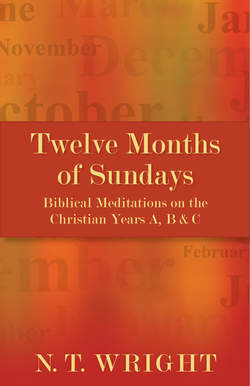Читать книгу Twelve Months of Sundays - N.T. Wright - Страница 37
На сайте Литреса книга снята с продажи.
ОглавлениеThe Third Sunday of Easter
Acts 2.14a, 36–41
1 Peter 1.17–23
Luke 24.13–35
Today’s readings bubble over with the excitement of the new moment that has dawned in Israel’s story, in the world’s story, with the resurrection. It isn’t merely that God is offering a new kind of spiritual experience, or that there is now a new belief in life after death (which most Jews believed in anyway). It is the sense that something has happened, as a result of which everything is different.
But the thing which had happened was emphatically not what was expected. Theories about ‘cognitive dissonance’, that highfalutin pseudo-medical term used by some to say that the disciples were so overwhelmed with disappointment at Jesus’ crucifixion that they simply went on believing what they had believed anyway, simply won’t do. ‘We had hoped’, say the two on the road to Emmaus, ‘that he was the one who would redeem Israel.’ But (the implication runs) they crucified him, so obviously he wasn’t. Everybody knows that a crucified Messiah is a contradiction in terms. We are just another failed messianic movement.
They were like people on a hillside, watching eagerly for the sunrise. (This image works better in the tropics where there’s no twilight.) Disoriented, they are facing the wrong way. The expected moment comes and goes, and nothing happens. Then they become aware that, though the sky they are scanning remains dark, light seems to be shining anyway. With a strange excitement they turn around, to see the sun shining in full strength in the very place they least expected it.
It was the Scriptures, not least (we must assume) the Davidic promises, that warmed their hearts with the thought that they had been looking in the wrong direction, and nudged them to turn around and face the real dawn. The biblical story was all about God bringing redemption, new life, through death and out the other side. To expect the ransoming of Israel in the sense they had cherished was to look in the wrong direction. The ransoming (an Exodus word, of course) had indeed occurred, but it was the deep, ultimate act that freed human beings from ‘futility’ (1 Peter 1.18: a human life that, failing to reflect God, decays and self-destructs). The new creation brought to birth at Easter would now be born within human lives, creating love, trust and hope. The transforming power lay precisely in God’s word (1.23).
Peter’s challenge to the Pentecost crowd contains perhaps the earliest ‘theology of the cross’ in the New Testament. (You may need to include some extra verses to get the full thrust.) Jesus’ dying and rising has broken through into a new way of being Israel, a new way of being human; so, urges Peter, turn quickly from your headlong flight into ruin, share in the new-Exodus life of which baptism is the sign and seal, celebrate God’s one-off act of forgiveness, and pass it on to everyone else. Now there’s a message as urgently needed today as ever it was.
